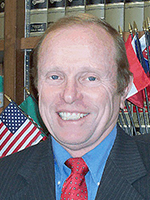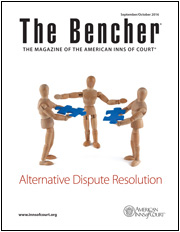Collins Fitzpatrick
2016 American Inns of Court Professionalism Award for the Seventh Circuit
By Jennifer J. Salopek

 When Collins Fitzpatrick was hired to be a law clerk for a year at the U.S. Court of Appeals for the Seventh Circuit in 1971, he probably never foresaw that he would still be with the circuit 45 years later. Fitzpatrick became circuit executive for the federal courts of the seventh circuit in 1976; he is the only person to have held the position. Congress created the position in 1971 and Chief Judges Swygert and Fairchild apprenticed him into the position. Fitzpatrick says, “I look at my job as ensuring that the 15 courts in the seventh circuit operate well.” In a quest for continuous improvement among other ways, he reads the appellate briefs and decisions, learning about the quality of justice, problems, and issues that should be addressed by the chief judge, the Seventh Circuit Judicial Council, and the Seventh Circuit Judicial Conference. In a role that is “half law and half administrative,” Fitzpatrick assists the Circuit’s 155 judges and court staff with many issues.
When Collins Fitzpatrick was hired to be a law clerk for a year at the U.S. Court of Appeals for the Seventh Circuit in 1971, he probably never foresaw that he would still be with the circuit 45 years later. Fitzpatrick became circuit executive for the federal courts of the seventh circuit in 1976; he is the only person to have held the position. Congress created the position in 1971 and Chief Judges Swygert and Fairchild apprenticed him into the position. Fitzpatrick says, “I look at my job as ensuring that the 15 courts in the seventh circuit operate well.” In a quest for continuous improvement among other ways, he reads the appellate briefs and decisions, learning about the quality of justice, problems, and issues that should be addressed by the chief judge, the Seventh Circuit Judicial Council, and the Seventh Circuit Judicial Conference. In a role that is “half law and half administrative,” Fitzpatrick assists the Circuit’s 155 judges and court staff with many issues.
During his tenure, Fitzpatrick has witnessed enormous change, from an organization without staff attorneys, circuit executives, or magistrate judges, to a sophisticated operation that leverages technology and management skills to improve the courts’ functionality in an era of expanding caseloads.
The nature of those caseloads has changed as well. When Fitzpatrick assumed his role, “We didn’t have a lot of guns and drugs,” he says. Most cases were for white-collar crime and defendants were rarely incarcerated. Nowadays the court is much more security-conscious and the majority of crime involves guns, drugs, and gangs.
Fitzpatrick grew up on the South side of Chicago, and still lives within a mile of his childhood home. He followed in the public service footsteps of his assistant state’s attorney father, who died when he was 14. While a student at Harvard Law School, he worked with the Cambridge Legal Assistance Office, where he was representing clients in court by his second year of law school and got his first exposure to professionalism and civility in practice from the attorneys supervising the program. After graduation, he spent two years providing legal assistance to the poor in Cook County, Illinois.
“I was always interested in public service, but I also wanted to be able to raise a family and legal service lawyers did not make much,” he says. He went to the seventh circuit for a one-year appointment as a law clerk and never left.
Fitzpatrick’s altruism now manifests itself in his service as a volunteer arbitrator and mediator through the American Arbitration Association and the CPR Institute for Dispute Resolution. “Lawyers have gained a reputation as being too litigious, and some of it is well deserved,” he says. “We should be helping all people with legal needs. Lawyers should be trying to keep people out of court and people need to be encouraged to consult lawyers earlier.”
A member of the Chicago American Inn of Court, Fitzpatrick says, “Blessed be the peacemakers. Mediators will save our professional reputation, because they solve problems that do not need to be resolved by litigation.” He also adds: “Experienced lawyers and judges have an obligation to bring along younger people, and the American Inns of Court provide the ideal forums.”
Issues of judicial disability and misconduct and the appointment of bankruptcy judges are the most important things Fitzpatrick works on. He has brought his experience with these issues, as well as his expertise in arbitration and medication, to bear in consulting and speaking engagements all over the world, including Australia, Russia, China, Turkey, and Laos.
“My central theme is judicial independence and its importance to the rule of law,” he says. “We need good judges who exercise self-discipline through codes of conduct.”
He deplores the politicization of the judiciary in this country. “It’s very bad, something we need to stop. Judges should be selected solely on their integrity and good judgement, their ability to make decisions on difficult issues. Politicization, security threats, and campaign costs, dissuade good people from becoming a judge—nobody takes a job thinking that they’re putting their family at risk.”
With no thoughts of retirement, Fitzpatrick continues to pursue the ideal of a truly independent judiciary. Although he “felt a loss” when he could no longer represent people in court as a lawyer due to his position, he represents all stakeholders as he ensures the highest possible quality of justice in the seventh circuit.
Jennifer J. Salopek is a freelance writer based in McLean, Virginia.
© 2016 American Inns of Court. This article was originally published in the September/October 2016 issue of The Bencher, a bi-monthly publication of the American Inns of Court. This article, in full or in part, may not be copied, reprinted, distributed, or stored electronically in any form without the express written consent of the American Inns of Court.